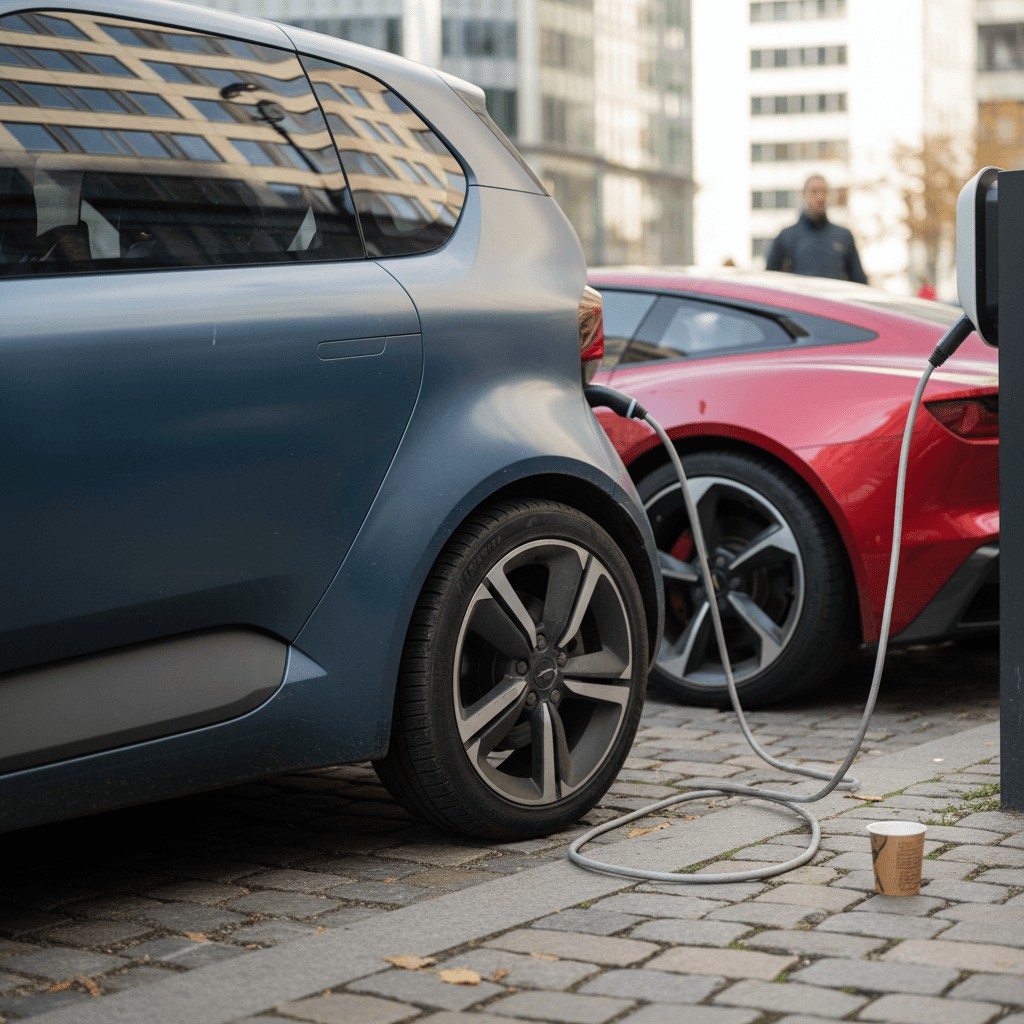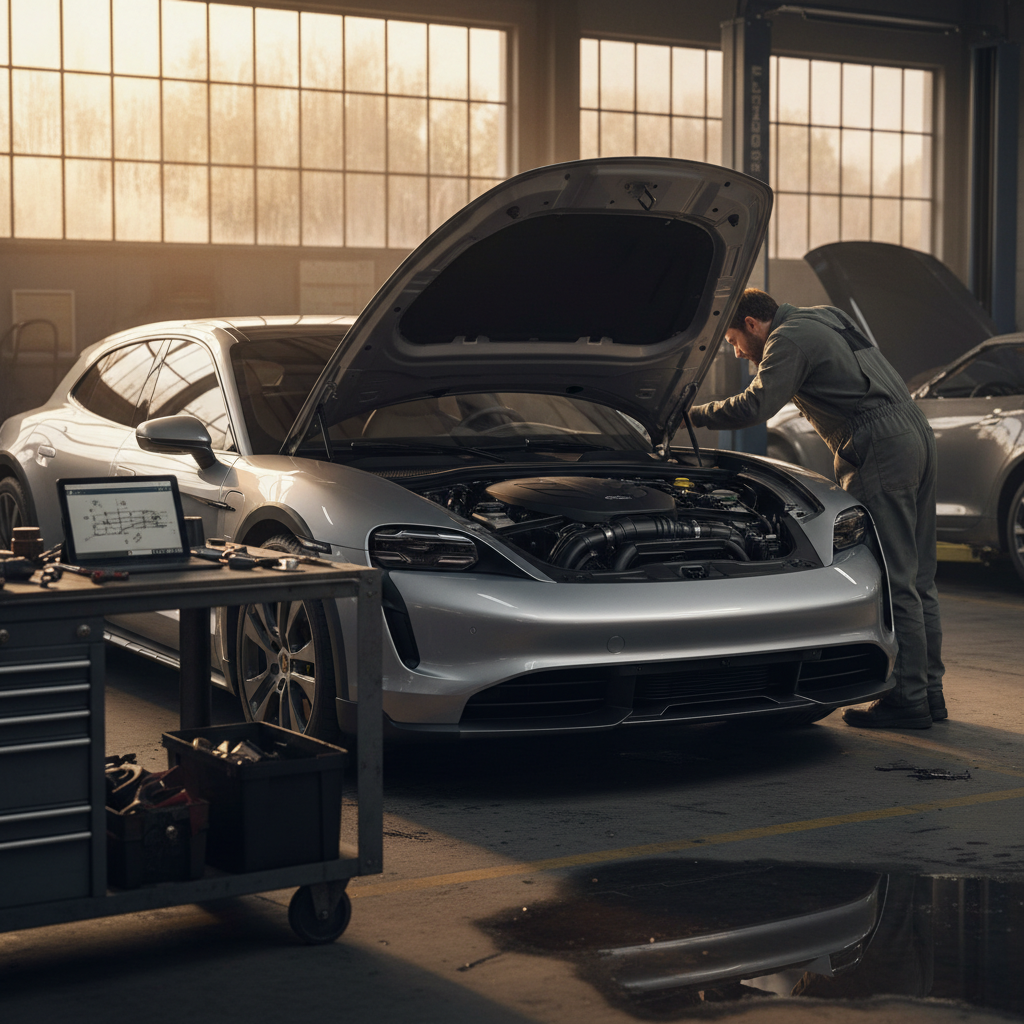You type “auto garage near me” into your phone, but you’re driving an electric vehicle. That changes the game. Not every neighborhood shop that can handle an oil change or timing belt is ready for high‑voltage batteries, over‑the‑air software updates, and brand‑specific diagnostic tools. This guide walks you through how to find the right garage for an EV in 2025, what work they should handle, and when to look for a specialist, or let a company like Recharged shoulder the hard parts for you.
EV service is still catching up
Why “auto garage near me” means something different with an EV
For a gasoline car, an auto garage near you mainly needs to understand engines, transmissions, fluids, and emissions systems. With an EV, the emphasis shifts to high‑voltage safety, battery management, and complex electronics. The wrong shop can be more than just a little inconvenient; it can be unsafe or very expensive.
The shifting EV service landscape in 2025
Why it matters
Types of auto garages and what they mean for EV owners
Common “auto garage near me” options
How each fits into an EV owner’s maintenance plan
Franchised dealership
Best for: warranty repairs, recalls, complex software or safety system issues.
- Brand‑specific tools and access to factory support.
- EV‑trained techs more likely, but not guaranteed.
- Often the most expensive option.
Independent general garage
Best for: tires, alignment, brakes, suspension, interior repairs.
- Lower hourly rates than dealers in many markets.
- EV expertise varies widely, always ask.
- Good for routine wear items once they’re comfortable with EVs.
EV‑focused specialist
Best for: high‑voltage faults, battery concerns, complex electronics.
- Built around EV and hybrid work.
- Staff trained specifically on electric drivetrains.
- Often more flexible and customer‑focused than dealers.
When the dealership still makes sense
- Your EV is under factory warranty and the issue is clearly covered.
- You’re dealing with recalls, safety campaigns, or software updates.
- There are no independent EV specialists within reasonable distance.
When a non‑dealer garage is better
- You’re out of warranty and want to control costs.
- You need routine wear‑and‑tear items like tires or brake pads.
- You’ve found an independent shop with documented EV training and good reviews.
How to actually search for an EV‑friendly auto garage near you
The way you type your query matters. Searching just “auto garage near me” will surface every shop in driving distance; only a fraction will be ready for EVs. A few tweaks make your results much more useful.
- Search specific: try phrases like “EV repair shop near me,” “electric car mechanic,” or your model plus “service” (for example, “Nissan Leaf service near me”).
- Use map filters: on Google Maps or Apple Maps, open each candidate and look for terms like “hybrid & EV,” “battery electric,” or photos showing an EV on a lift or charger.
- Check their website: scan for EV‑specific language, training badges, or examples of the models they service, many new EV shops are proud to say so.
- Look beyond ads: top sponsored results aren’t always the most qualified. Scroll to see highly reviewed independents that mention EVs in their descriptions.
Shortlist a few shops

Key questions to ask a garage before you book
Once you’ve found a few promising results for “auto garage near me”, it’s time to vet them. A quick phone call can save you hours of frustration and a lot of money.
Use this script when you call
1. “How many EVs do you service each week?”
You’re listening for a clear, confident answer. A shop that regularly sees EVs will be able to give you a ballpark number and mention common models.
2. “Do your technicians have EV or high‑voltage training?”
Look for phrasing like <strong>OEM EV training, hybrid/EV certification, or high‑voltage safety courses</strong>. If they hesitate, they probably don’t have it.
3. “What EV brands or models do you see most often?”
A good answer names specific brands (Tesla, Hyundai, Ford, GM, etc.) and models. The more overlap with your car, the better.
4. “Which EV jobs do you handle in‑house?”
Most independents can handle tires, brakes, suspension, and 12‑volt electrical. Only some will touch drive units, battery packs, or high‑voltage components.
5. “How do you handle diagnostics on EVs?”
You want to hear that they use <strong>factory‑level or reputable aftermarket scan tools</strong>, not just a generic OBD reader from a parts store.
6. “Are your parts OEM, aftermarket, or a mix?”
There’s nothing wrong with quality aftermarket parts, but for safety‑critical items or unique EV components, OEM or equivalent is often worth it.
Pro move: ask about a recent EV job
Signs you’ve found a garage that really understands EVs
You don’t have to be an engineer to spot an EV‑literate shop. A few visual and behavioral cues will tell you whether a local auto garage near you is genuinely comfortable with electric vehicles or just willing to “give it a shot.”
Positive signals in an EV‑ready garage
What to look for when you visit or browse photos online
High‑voltage safety gear
- Insulated gloves and tools visible in the shop.
- Clearly marked orange HV cables on vehicles.
- Lock‑out/tag‑out procedures posted.
Modern diagnostics
- Laptops or tablets at each bay.
- Talk of factory‑level software or subscriptions.
- Techs comfortable discussing data logs and fault codes.
Transparent communication
- Clear estimates and line items.
- Explanations you can understand without jargon.
- Photos or videos of work performed when requested.
Red flags, time to keep searching
What maintenance your EV still needs (and who should do it)
It’s true that EVs skip oil changes, spark plugs, and a lot of engine service, but they’re not maintenance‑free. You’ll just deal with a different list, and you can mix and match which auto garage near you handles what.
Common EV maintenance items and who should handle them
Use this as a quick guide when you’re deciding which garage is right for a particular job.
| Maintenance item | Typical frequency | Good fit: dealership | Good fit: independent garage | Good fit: EV specialist |
|---|---|---|---|---|
| Tires & rotations | 6,000–10,000 miles | ✔ | ✔ | ✔ |
| Wheel alignment | When pulling or after potholes | ✔ | ✔ | ✔ |
| Brake pads & fluid | Pads: varies, fluid: 2–3 years | ✔ | ✔ | ✔ |
| Cabin air filter | 1–2 years | ✔ | ✔ | ✔ |
| Coolant for battery/drive unit | Per owner’s manual (often long intervals) | ✔ | Maybe | ✔ |
| High‑voltage battery diagnostics | As needed | ✔ | ✖ | ✔ |
| Drive unit / inverter faults | As needed | ✔ | ✖ | ✔ |
| ADAS calibration (cameras/radar) | After windshield or collision work | ✔ | Some | ✔ |
For anything involving high‑voltage systems or safety‑critical software, lean toward an EV specialist or franchised dealer, especially while your car is under warranty.
Read the maintenance schedule, not social media
EV battery health: when you need a true specialist
The battery pack is the heart, and the biggest expense, of your EV. If your range is dropping faster than expected or you’re seeing high‑voltage warnings, you don’t want a generalist learning on your car.
High‑quality battery work typically lives with franchised dealers and a small but growing group of independent EV specialists. These shops invest in manufacturer‑level tools, insulation monitoring gear, and training so they can safely open packs, replace modules, or verify that your battery is still performing close to spec.
“EVs need less maintenance overall, but when something goes wrong with a battery or high‑voltage system, you want a shop that’s done it before, not one that’s reading the manual for the first time on your car.”
Where Recharged comes in on battery health
Cost comparisons: dealer vs independent garages for EV work
When you’re staring at a list of search results for “auto garage near me”, it’s tempting to sort by price alone. But EV service pricing is nuanced: dealers may charge more per hour, yet be faster on complex jobs; independents may save you money on routine work but outsource specialized tasks.
Where dealers often cost more
- Labor rates: many franchised dealers have the highest posted hourly rate in town.
- OEM parts only: that’s good for quality but not always for your wallet.
- Menu pricing: convenience packages can bundle services you don’t really need.
Where independents can save you money
- Routine wear items: tires, brakes, suspension, and basic electrical work.
- Flexible parts sourcing: OEM when it matters, reputable aftermarket when it doesn’t.
- Used or refurbished components: especially on out‑of‑warranty EVs and older models.
Cheap isn’t a bargain if it’s wrong
How Recharged fits into your “auto garage near me” search
If you’re shopping the used market, you’re not just picking a car, you’re picking what your future service experience will look like. That’s where Recharged can quietly make your “auto garage near me” searches a lot less stressful.
How Recharged helps you win at the service game
From the first test drive to your first trip to a local garage
Battery health transparency
Better match to local service
Nationwide delivery, local ownership
Because the whole experience is digital, with financing, trade‑in, and expert guidance included, you can focus on finding an EV that fits your life and your local service landscape, instead of hoping your nearest dealer will still be EV‑certified two years from now.

FAQ: “Auto garage near me” when you drive an EV
Frequently asked questions about EVs and local garages
Bottom line: choosing the right garage for your EV
Typing “auto garage near me” is only the start. For EV owners, the real work is choosing which of those results you can trust, and which jobs to give them. Use targeted searches, ask direct questions about EV training and recent experience, and match the right shop to the right task. Lean on dealers and EV specialists for high‑voltage and software work, and build a relationship with a trustworthy independent for routine wear items.
If you’re still shopping for a used EV, remember that the car you choose and the service options near you are two sides of the same coin. Recharged exists to make that whole journey simpler, with verified battery health, fair pricing, EV‑savvy guidance, and nationwide delivery that ends with your local garage, and you, set up for success.



